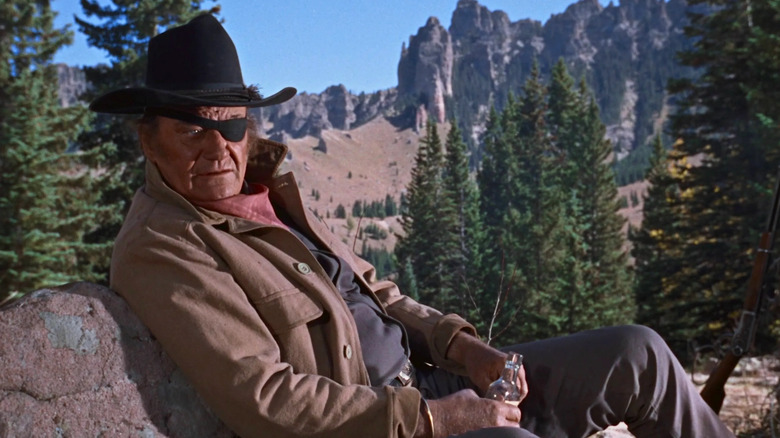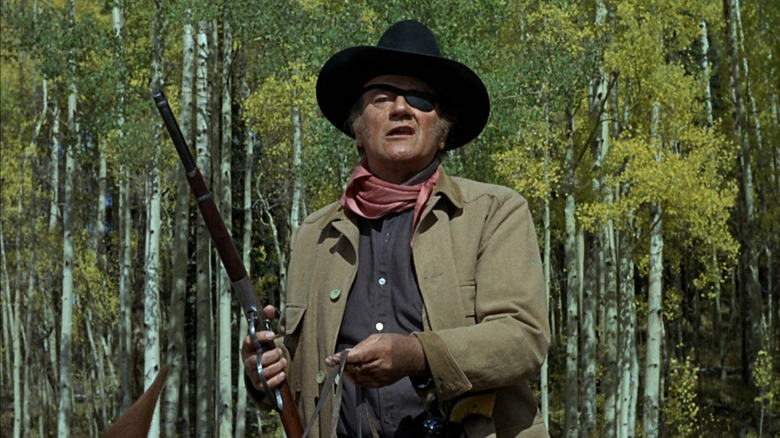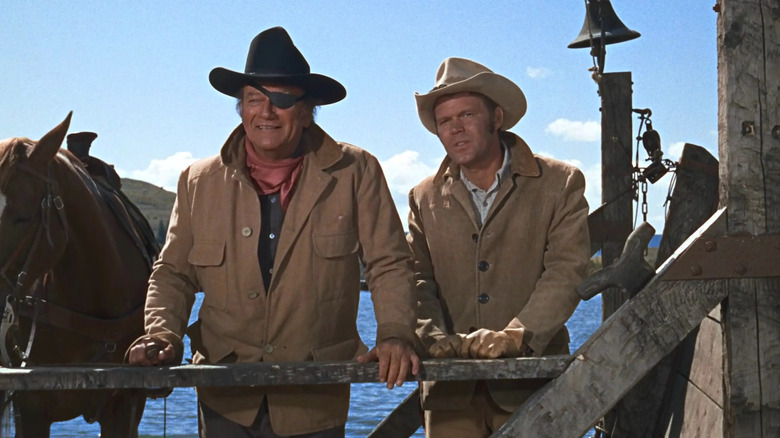True Grit's TV Rights Sparked A Legal Battle With John Wayne
Just how much is an Academy Award worth? That's exactly what John Wayne wanted to know after he starred in the 1969 film "True Grit." In the Western, based on the Charles Portis novel of the same name, a drunken, grizzled, one-eyed U.S. Marshal (Wayne) teams with a Texas Ranger (Glen Campbell) and a teenage girl (Kim Darby) to track down the killer of the girl's father.
"True Grit" is not only a throwback to director Henry Hathaway's older Westerns, but it's a drama that doesn't take itself too seriously. The movie gave audiences a respite from the gritty realism and counter-culture movement happening in U.S. cinema in the late 1960s. After the movie's release there was talk that Wayne might win his first Academy Award for Best Actor. Even Roger Ebert, admittedly not the biggest fan of The Duke, praised his performance in the film.
"Wayne towers over this special movie. He brings an ease and authority to the character. He never reaches. He never falters. It's all there, a quiet confidence that grows out of 40 years of acting."
Despite Wayne's Oscar buzz and the critical success of "True Grit," Paramount Pictures was in a hurry to sell the film's television rights. It prompted a battle that played out in the courtroom, far from the Colorado plains of the western drama.
Paramount sold the TV rights while it was still in theaters
"True Grit" was released in theaters on June 11, 1969 to immediate critical acclaim. The New York Times called it "a marvelously rambling frontier fable packed with extraordinary incidents, amazing encounters, noble characters and virtuous rewards." The film also features what Wayne considered the best scene he ever shot.
The western was also a commercial success, and Paramount Pictures wasted no time in trying to capitalize on the momentum. In September of 1969, while the film was still in theaters, Paramount sold the television rights to "True Grit" along with 24 other films to ABC in a $15 million package.
In the book "John Wayne: The Life and Legend," author Scott Eyman explains why Wayne and fellow film producers took umbrage with the Paramount sale. It all centered around the value in the potential Oscar win for Wayne. Eyman notes a letter from film producer Joseph Hazen to Paramount on behalf of Wayne and co-producer Hal Wallis. In his letter, Hazen pleads:
"There is nothing to be gained by making a sale of 'True Grit' now. As 66% owners of the profits from the network telecast of 'Grit,' it is our deep conviction and strong feeling that Paramount should neither offer nor sell 'True Grit' to the networks at this time, and that it should definitely and positively await the results of the Academy Awards before it offers the picture for network showing."
Paramount ignored their request and sold the rights anyway, prompting Wayne and the producers to sue the studio. If you know anything about classic westerns, you know to never bet against The Duke, and the same applied in the courtroom.
In April of 1970, Wayne won his first Oscar for Best Actor. It was enough ammunition for The Duke to take down the big, bad studio. The court agreed that Wayne's Academy Award made "True Grit" much more valuable and Wayne's group received a settlement from Paramount for more money.
It was John Wayne's only Oscar
John Wayne is one of the most iconic and well-known names from the classical Hollywood era. So it makes sense that Wayne might have been a bit more sensitive to the issue given that the impending Academy Award would be his one and only Oscar.
In 1949, he earned an Academy Award nomination for Best Actor for his portrayal of Sgt. John Stryker in "The Sands of Iwo Jima." In 1960, Wayne produced, directed, and starred in "The Alamo." The movie was nominated for Best Picture. However, it was only his role as Rooster Cogburn in "True Grit" that allowed Wayne to bring home some hardware.
It was well-deserved, and some argued overdue, after his snub for "The Searchers." Wayne's performance in "True Grit" was praised by Variety:
"It's mostly Wayne all the way. He towers over everything in the film – actors, script [from Charles Portis' novel], even the magnificent Colorado mountains. He rides tall in the saddle in this character role of 'the fat old man.'"
Perhaps even more important than the statue, Wayne's performance in "True Grit" redeemed the actor after his castigated propaganda war film, "The Green Berets." The movie also created an aging character archetype that would launch the second half of his career. "It was a role he would play, with some variations, for the rest of his life," Eyman writes in his book. "Not a culture warrior, but an old man dredging up enough strength for one last hurrah."


